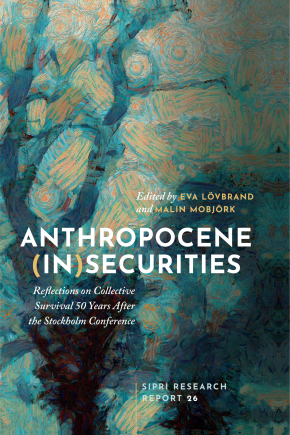Anthropocene (In)securities: Reflections on Collective Survival 50 Years After the Stockholm Conference

In June 1972, the United Nations Conference on the Human Environment was held in Stockholm, Sweden. This event, also known as the Stockholm Conference, was the first of its kind, and it reflected mounting concerns with the transboundary environmental problems caused by modern industrial society. Fifty years later, we find ourselves in a world marked by profound, accelerating and possibly irreversible environmental change. Today, there is simply no place on earth untouched by human influence. The Anthropocene is a concept that has been advanced to capture this novel environmental condition. It refers to an unpredictable and fragile era in planetary history when humanity is dangerously disrupting the earth’s biosphere and life-upholding systems.
This volume brings together an interdisciplinary team of scholars and policy experts to examine what security means in this new world of humanity’s own making. It asks how global institutions can respond to the systemic production of environmental risks and insecurities, and what political innovations are needed to chart a more sustainable path for global development in the decades to come. The 50-year anniversary of the UN Conference on the Human Environment offers an important backdrop to the volume and an opportunity to imagine constructive ways ahead.
Foreword by Jan Eliasson
1. One earth, multiple worlds: Securing collective survival on a human-dominated planet
Eva Lövbrand, Malin Mobjörk and Rickard Söder
Part I. Governing the environment and security nexus: Looking back, thinking ahead
2. Geopolitics and the United Nations Conference on the Human Environment
Björn-Ola Linnér and Henrik Selin
3. Climate change and security within the United Nations: Insights from the UN Environment Programme and the UN Security Council
Lucile Maertens and Judith Nora Hardt
4. The responsibility to prepare and prevent: Closing the climate security governance gaps
Marcus D. King, Caitlin Werrell and Francesco Femia
5. The security space in the Anthropocene epoch
Dan Smith
Part II. Reimagining security in an entangled world
6. To build a better world: Securing global life after fossil fuels
Simon Dalby
7. From human environment to post-human earth: Troubling the nature/culture divide in the Stockholm Declaration
Anthony Burke and Stefanie Fishel
8. Whose security/security for whom? Rethinking the Anthropocene through ontological security
Beatriz Rodrigues Bessa Mattos and Sebastián Granda Henao
Afterword by the volume authors

